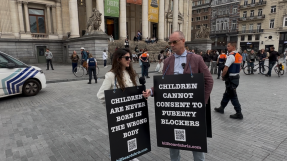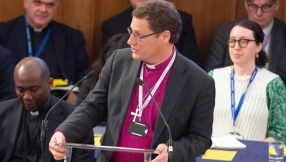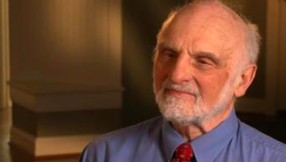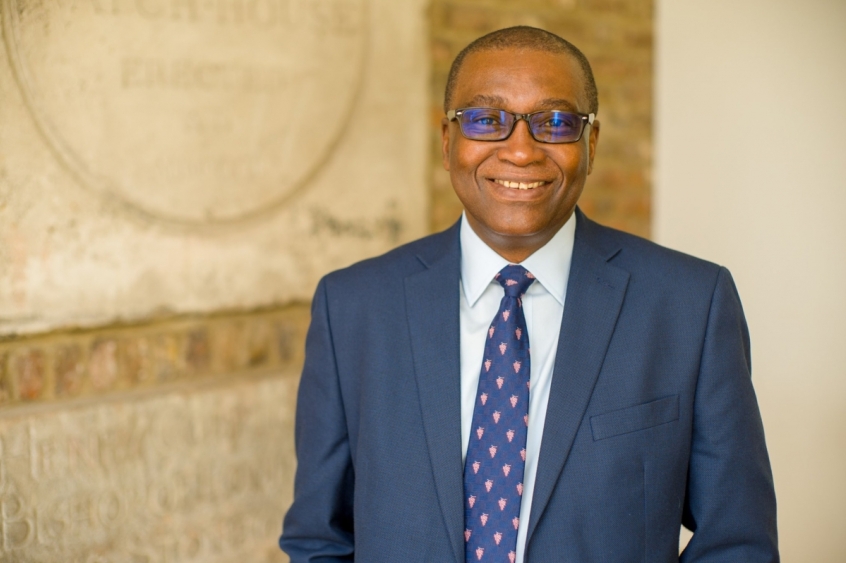
Seyi Obakin OBE has been CEO of homeless charity Centrepoint since 2009. A committed Christian, he says his faith is pivotal to how he approaches his work with young homeless people.
He speaks to Christian Today about why young people end up homeless, the pressures of the pandemic on charities like Centrepoint, and how his Christian faith inspires him to do the work he does.
CT: Why do some young people find themselves sleeping rough on the streets?
Seyi: Rough sleeping is merely the tip of an iceberg. The iceberg itself is homelessness and unless you tackle the iceberg, you will always have the tip appearing above the surface. We need to look at what's happening beneath the surface.
Young people sleep rough when they have come to the end of their options. The first thing many will try and do is find someone they know, maybe an aunt, an uncle or a friend, and sleep on their sofa or the floor. Failing that, they might try other options like going up and down on the night bus all night long, or worse still, end up in a stranger's bed because the stranger is offering them a place to put their head - what is now known as sex for rent.
So, the real issue is why young people become homeless in the first place and the most significant trigger of youth homelessness by far is a relationship breakdown in the family. This can be caused by things like mental health challenges, alcohol abuse or drug abuse, or domestic violence.
Youth homelessness is also caused by failures at points of life transition for young people – for example, when they leave the care of a local authority or an institution, or when a tenancy comes to an end. We've had calls from families asking us to take in their young people because the tenancy came to an end, but the family was unable to find another home to move to, making the family homeless. These are some of the transition points at which failure can occur.
CT: When young people come to Centrepoint what are you able to do for and with them?
Seyi: The first and most important thing is to provide the young person with safety and security; a safe place to live where they have the security of knowing that they will not be thrown out. But that's not enough. We also need to enable, inspire and motivate the young person to thrive because what we really want is for them to be able to move on from us with a job and a home. That way, they are unlikely to become homeless again and will be able to hold their own. So, our work goes far beyond providing shelter – the young person also needs to get healthy and gain some skills and qualifications.
CT: How much is trauma a factor in the experience of young homeless people? Do they need emotional support as well?
Seyi: Absolutely. If you think about the journey that a young person has had before getting into one of our services, it is almost entirely traumatic. The process of family breakdown is gradual, and that itself creates trauma, let alone the aftermath. Thus, the young people who come to us often need emotional support and in a lot of cases, mental health support. Just over half of the young people who come to us report a mental health problem. So, we help young people to get healthy and that is about emotional health, physical health and mental health.
But we don't stop there. We also motivate them to acquire skills because they can't move into further education or a job if they haven't got the right skills. For some young people that might mean going back to literacy and numeracy - in fact, between 20 and 25 per cent of the young people who come to us are not sufficiently literate or numerate. And so we have to help them acquire those skills and become confident in using them so that they can move on into education or vocational training or an apprenticeship.
And it's not just about hard skills; it's also about soft skills - things like: how you manage your relationship with money. We all have a relationship with money and, whether it's a good one or not, managing our relationship with money is something we all need to do well in life to be successful.
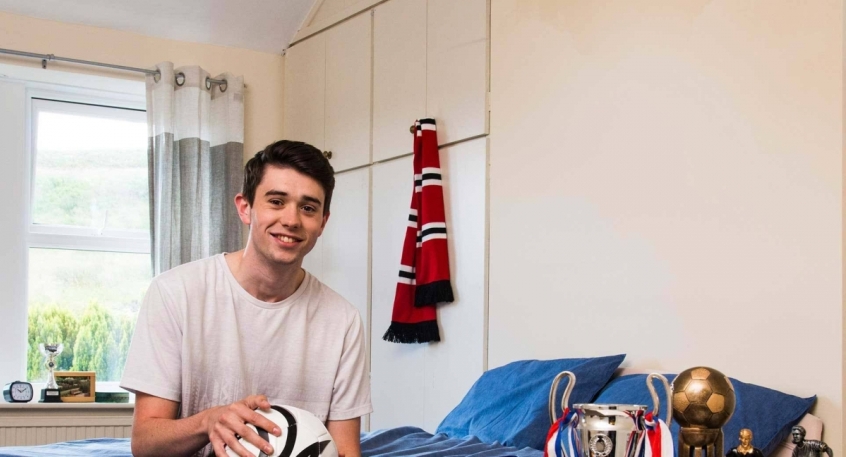
There are other soft skills around managing their relationships with other people and learning to recognise healthy relationships that they should be involved in and the unhealthy ones they should avoid; or how to conduct themselves in a workplace and how to speak back to other people.
So we help them with both the soft skills and hard skills that they need in order to be ready to move into a workplace or education. Once they are able to get a job, then they can be helped to live independently on their own.
CT: How long is a young person usually in the care of Centrepoint?
Seyi: It depends on their individual journey but typically between six months and two years. We never ask someone to leave because they have done two years with us; we will keep helping until they are ready to move on. However, we may sometimes have to ask a person to leave if they don't want to help themselves i.e. if after doing everything we can to help them, they have decided by themselves that they do not wish to engage in our services or take our offer of help, then we may have to ask that person to leave in order that we can offer our help to someone else who does want it. Thankfully such occurrences are rare.
CT: Has the pandemic impacted the numbers coming to Centrepoint for help or has that remained stable?
Seyi: We only have a finite number of beds so we cannot take in everyone who wants our help, but we have seen an increase of over a third in calls to our national helpline and around a 40 per cent increase in demand for our mental health services. These are all indications that these issues have gotten worse during the pandemic and that is not entirely surprising. We know that the lockdowns and restrictions created a pressure cooker environment for families and as we discussed earlier, family breakdown is a key driver of youth homelessness.
One other thing to note is that young people have often borne the brunt of the economic downturn of the pandemic because a lot of young people worked in the sectors that were hardest hit such as hospitality, catering and entertainment. Unfortunately, people working in these sectors who could not be furloughed were disproportionately hit by the loss of income. So, yes the pandemic has led to more youth homelessness.
CT: And what about yourselves as a charity trying to assist them. Have you been impacted?
Seyi: We have been impacted - and significantly so - but more in practical ways. We offer a range of services to young people and a lot of this is face to face. For example, teaching young people the functional skills of literacy and numeracy is something we do in person because it is embarrassing to admit that one cannot read or write properly. To help with this, our approach is not to put young people in a classroom with lots of other people but to teach them one on one, face to face, until they have built up the confidence to complete their learning in a group.
In the same way, all of the work we were doing to help young people find emotional stability and support their mental health was face to face, but the pandemic meant we had to find a different way to do that. We had to convert all those services into a virtual format. That was not easy because although we could find the resources to do it in a technical sense, we also had to find a way for the young people to access the provision. As you might imagine, being homeless, they didn't have laptops and many didn't have smartphones, and even if they did, they didn't have data.
But we have been incredibly blessed with support from all manner of people, from philanthropists and donors giving hundreds of thousands of pounds, to the general public giving £10 or £20 a month. This means we have not had to cut down on our services to young people and we are really grateful and blessed to be in that position.
CT: You are a Christian yourself and some churches have reported being impacted by a shortage of volunteers during the pandemic. Have you experienced something similar to this?
Seyi: It has been an issue but only to the extent of managing the flow of volunteers. We are in the happy position of not being short of people wanting to help but the issue for us has been in scheduling these and in training people up because any work with young people requires prior training. The young people we serve have had traumatic experiences so we have to be psychologically informed in how we seek to help them so that we can gain their trust and they will feel able to talk to us.
Many of them have had to engage with the authorities in the past and sadly these engagements haven't always been positive. Where this is the case, they've learnt to protect themselves by revealing as little of themselves as possible. That is simply because the more of yourself you reveal, the more vulnerable you become to the person you are revealing yourself to.
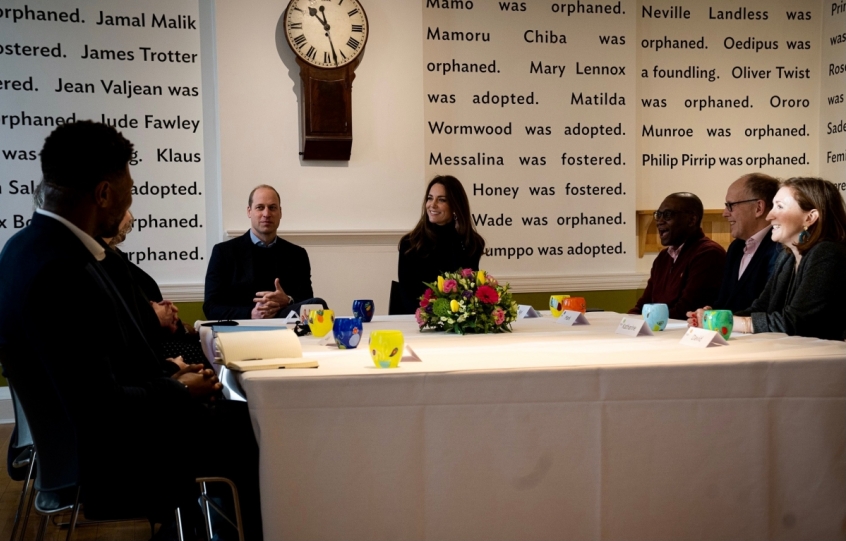
And so gaining their trust takes time and skill, and volunteers need training to understand what's happening. For example, sometimes you might perceive that a young person is behaving aggressively but in fact they might not, and even if they were, it is not just for the fun of it. In many cases, it is behaviour that is rooted in their previous experiences and how they've learnt to protect themselves. The training we provide helps volunteers put this kind of behaviour within its proper context, get beyond it, and understand how to get the best from that young person.
The other thing that is really important for us in terms of our volunteers is commitment. Many of the young people we serve have experienced a lot of instability in their lives before they came to us, so we always ask for commitment from our volunteers. That's because it's really important that they don't just flit in and out of the life of a young person as that will just reinforce the instability they had experienced before. Our volunteers need to be a stable presence but of course, that hasn't been easy during the pandemic.
So it's not been a lack of volunteers that has been the issue for us but being able to commit to doing it over a long period of time and being able to offer young people the stability they need.
CT: How does your Christian faith motivate you in your work?
Seyi: I see a strong connection between my faith and my work here at Centrepoint. There is a strand woven through God's word of His care for the downtrodden, the outsider, the stranger, the lonely, the homeless. I believe my faith places a duty on me to care for the vulnerable, to look out for them and to treat them in ways I would want to be treated myself.
The story of Ruth in the Bible is a great example to follow. Here a destitute Moabite woman, the widow of an Israelite, goes back to her late husband's hometown with his mother Naomi and gleans the fields for leftovers. When the farmer Boaz sees her, he leaves extra for this foreigner to gather. To me that's how we are supposed to look out for and care for the downtrodden and vulnerable that God has entrusted to us.
The media so often tells us that we should be sceptical of the homeless, sceptical of refugees who would come here and bring their customs and 'take our resources'. We hear these things all the time, and naturally, buy into it. But as Christians we must balance all that scepticism with our duty of care and remember that we can trust our God whose abundance is limitless. We must remember that if God blesses us then it is for us to bless others.
I know that God has placed me here at this time, for this purpose, and with His help I will do the best that I can. This is perhaps the most influential factor in what I seek to do and how I approach it.
CT: Centrepoint is not a Christian charity but it has Christian roots. Do you see any ways in which the Church can support Centrepoint or young people in their communities who are homeless or at risk of becoming homeless?
Seyi: Yes, Centrepoint is not a Christian charity but it was started in 1969 by a vicar who wanted to do something for homeless young people, so Centrepoint like many other charities came out of the Church. And I think the Church has a role to play in helping the vulnerable, whether it's homeless people or others, because churches can reach people and places that secular society cannot reach and that is because we can communicate God's love in a way that a secular organisation could not.
Centrepoint is a secular charity and there are laws around that but none of these laws constrain me from demonstrating God's love in the work that I do or the way that I conduct myself. I really believe it's our conduct that will draw people to us. When the Church steps out with that love, people will be naturally drawn to it.










